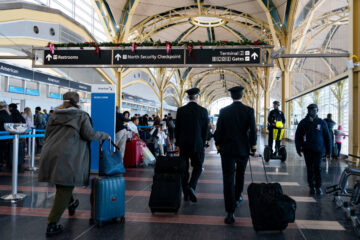While airports across the world are equipped with hundreds of plugs and outlets in which travelers with a dying battery can charge up their phones, cybersecurity experts have spent more than a decade sounding the alarm about plugging one’s device directly into one in crowded public areas like airports and hotels.
Without an external battery or a specialized charger that blocks data transfers, a phone inserted into a wall plug can be “juice jacked” — a practice in which hackers can install malware and use the corrupted charging port to access one’s phone data (users would get a pop-up that many dismiss or automatically accept).
While such instances are extremely rare, they pose a major security risk given the breadth of data that hackers are able to access and then sell or use for other bad ends.
Don’t miss the move: SIGN UP for TheStreet’s FREE Daily news
TSA to travelers: ‘Do not plug your phone directly’
The Transportation Security Administration (TSA) periodically issues warnings to not use the plugs directly and also be vary of the free WiFi provided by the airport particularly if making purchases or otherwise entering payment data.
“When you’re at an airport do not plug your phone directly into a USB port,” the TSA wrote in a recent social media post. “Bring your TSA-compliant power brick or battery pack and plug in there.”
Related: Another country is getting closer to fully scrapping passports
The advice was quickly called out by travelers for the fact of airports being the ones to equip their spaces with plugs that can be hacked and low practicality of telling travelers not to use that which is placed in front of them at gates.
More on travel:
US government issues sudden warning on France travelUnited Airlines places big bet on new flights to trendy destinationAnother country just issued a new visa requirement for visitors
“LMAO so don’t use the things airports have spent millions around updating their infrastructure,” Mark Massey wrote underneath the TSA’s Facebook post.
This spring, there have also been reports of the TSA pulling out and confiscating the portable chargers that travelers placed inside their carry-on bags. While the external chargers with what is typically a lithium ion battery are permitted to be brought aboard, having one that is too large or too powerful can lead to it getting confiscated.
An image captures an outlet plug on a wall.
Shutterstock
Worried about juice jackers? There are some simple ways to protect your phone
Confusion around what is allowed — due to the fire risk they pose, external batteries are no longer allowed to travel separated from the passenger in checked luggage — has also led to passengers simply leaving them at home. Using an external charger is, meanwhile, one of the ways that the TSA advises travelers avoid juice jacking.
For those who want to protect themselves against such hacking acts, another option is to attach a data-blocking adapter to the cable one uses in public or purchase a charger already equipped with this function.
USB ports that are commonly installed in smaller spaces around seats and tables also pose a higher risk of being equipped with malware than a direct wall outlet — something government agencies issue periodic warnings about despite challenges around making certain safety practices common.
“Bad actors have figured out ways to use public USB ports to introduce malware,” the FBI’s Denver branch wrote in April 2023. “Carry your own charger and USB cord and use an electrical outlet instead.”
Related: Veteran fund manager issues dire S&P 500 warning for 2025


